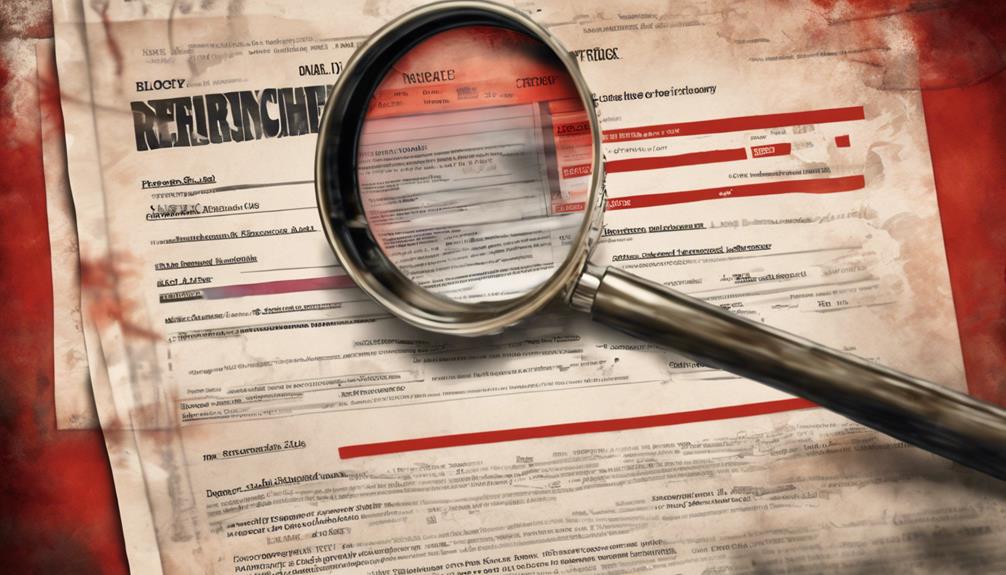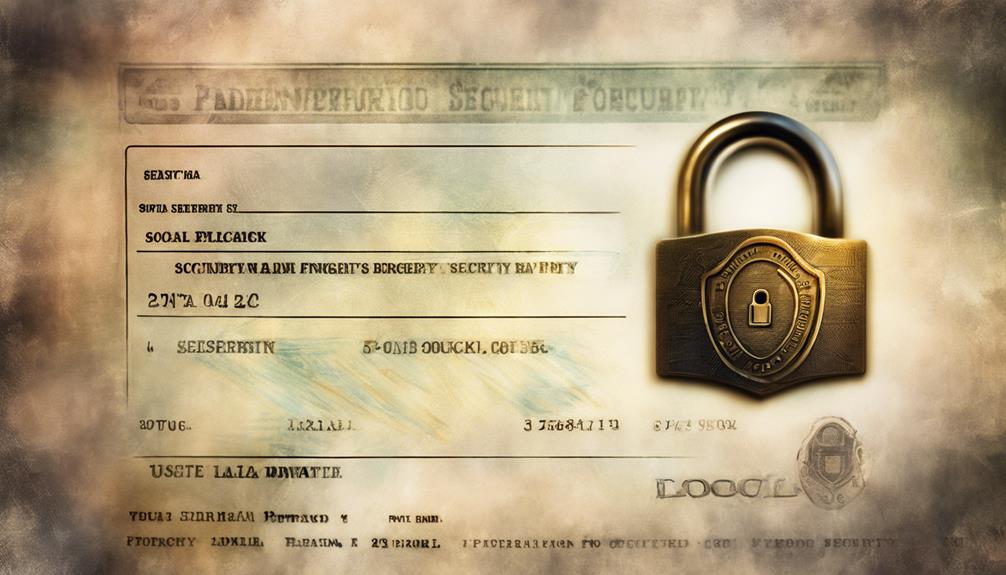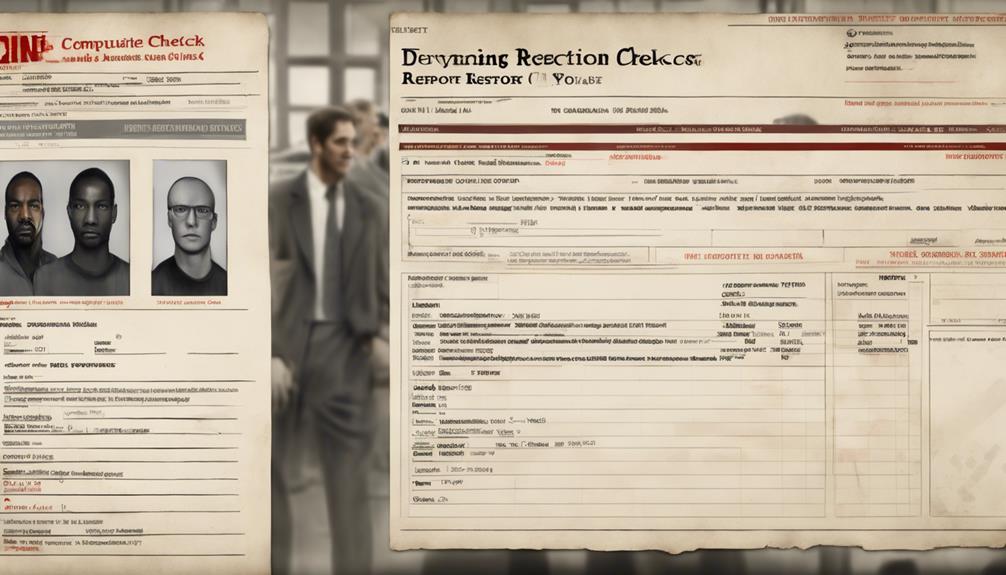Red flags on background checks, such as employment gaps, short job tenures, and educational inconsistencies, can raise concerns for hiring managers. Missing work history and criminal records also warrant attention. Poor credit history may suggest financial instability. These red flags provide valuable insights into a candidate's past behavior and integrity, influencing the hiring decision. Paying careful attention to these indicators can help employers make informed choices when selecting the right candidate for a job.
Key Takeaways
- Employment gaps, short job tenures, and missing work history raise concerns about stability and commitment.
- Educational inconsistencies and falsified qualifications signal lack of integrity.
- Serious criminal records and dishonesty about criminal history pose threats to workplace safety.
- Poor credit suggests financial instability and raises concerns in roles involving money management.
- Lack of financial management skills impacts trustworthiness, raises fraud risks, and hinders career advancement.
Employment Gaps

Employment inconsistencies often raise concerns during background checks, signaling potential issues with a candidate's work history and reliability. One common red flag that employers encounter is the presence of employment gaps. These gaps in work history can indicate periods of unemployment or inconsistency in job retention. While there can be various reasons for these gaps, such as career changes, illness, caregiving responsibilities, or involuntary job loss, employers should pay attention if they notice a pattern of frequent gaps.
Addressing employment gaps during the hiring process is essential as it can provide valuable insights into a candidate's background and help in making informed hiring decisions. When conducting a background check, employers should investigate further into the reasons behind these employment gaps to understand the candidate's overall work history better. By delving into the circumstances surrounding the gaps, employers can gain a clearer picture of the candidate's reliability and commitment to their roles.
Ultimately, recognizing and addressing employment gaps can play a crucial role in the hiring process by ensuring that employers have a thorough understanding of a candidate's work background before making a decision.
Short Job Tenures
Candidates with multiple short job tenures on their background check may raise concerns about their stability and commitment in the workplace. Short job durations often indicate a pattern of job hopping, which can suggest underlying commitment issues or difficulties in maintaining workplace relationships.
Employers value longer job tenures as they typically reflect stability and consistency in an individual's work history. High turnover rates in previous positions may lead employers to question the candidate's work ethic and suitability for long-term roles.
Consistent short job durations could also hint at a lack of clear career direction or challenges in finding the right fit within a specific role or organization. Employers may view such candidates as potentially risky hires, as they may be perceived as more likely to leave a position prematurely.
It's essential for candidates to address any concerns about short job tenures proactively during the interview process to demonstrate their commitment and ability to thrive in a long-term role.
Educational Inconsistencies

Upon reviewing background checks, discrepancies in educational details such as degrees earned, institutions attended, or graduation dates can raise red flags for employers. When dealing with educational inconsistencies, employers should pay attention to the following:
- Verification of academic background: Ensuring that the candidate's educational credentials are legitimate and accurately represented.
- Dishonesty concerns: Falsifying information about degrees earned or institutions attended can signal a lack of integrity.
- Qualifications match: Confirming that the qualifications claimed align with the job requirements to avoid hiring based on false pretenses.
- Misrepresentation risks: Inaccurate details regarding graduation dates or academic achievements may indicate a candidate's willingness to deceive potential employers.
In essence, scrutinizing educational inconsistencies is essential for employers to make informed hiring decisions and maintain the integrity of their recruitment process.
Missing Work History
Candidates with missing work history on background checks raise red flags for potential employers. Omitting relevant job experiences might suggest an attempt to conceal negative aspects, prompting concerns about honesty and reliability.
Employers must verify and understand any gaps in employment to make informed hiring decisions.
Employment Gap Concerns
A candidate's missing work history can raise red flags regarding their reliability, job stability, or undisclosed reasons. When evaluating missing employment periods, employers should address employment gap concerns by seeking transparency in work history.
Here are some key points to bear in mind:
- Transparency is Key: Candidates should be open about any gaps in their work history to provide a complete picture of their background.
- Job Stability Concerns: Employment history gaps may indicate difficulty in retaining jobs or frequent career changes.
- Reasons Behind Gaps: Employers should inquire about the reasons behind missing work history details, such as health issues or caregiving responsibilities.
- Thorough Evaluation: Addressing concerns related to employment gaps is essential to ensure a clear understanding of the candidate's professional trajectory.
Omitted Job Experiences
Excluding pertinent job experiences on a resume can raise significant concerns about a candidate's credibility and transparency. When candidates selectively omit parts of their work history, it can lead to doubts about their honesty and integrity. Employers may wonder if certain jobs were left out to conceal negative aspects or gaps in employment.
Furthermore, excluded job experiences might suggest a pattern of job hopping or an inability to maintain a position for an extended period.
To address concerns related to excluded job experiences, employers should take steps to verify the accuracy of the candidate's work history by contacting past employers. This verification process helps confirm that the candidate's resume aligns with their actual employment timeline and responsibilities.
Hidden Work History
Important concerns arise when work history is concealed or missing from a candidate's resume. Employers must pay attention to hidden work history as it may reveal gaps in employment that candidates haven't disclosed, indicating potential issues.
Omitting relevant work experience could lead to doubts regarding the candidate's qualifications and reliability, raising concerns about their suitability for the position. A pattern of job hopping or difficulties in maintaining long-term employment that emerge from a hidden work history might signal potential challenges in committing to a role.
Investigating reasons for missing work history is essential for employers to gain a thorough understanding of the candidate's background. Additionally, inconsistencies between the disclosed work history and actual experience can be red flags during the hiring process, prompting a closer examination of the candidate's honesty and transparency.
Criminal Records

Criminal records found on background checks may encompass misdemeanors, felonies, or pending charges. Employers conducting background checks must carefully evaluate a candidate's criminal history to assess any potential red flags that may arise during the hiring process. One major red flag is when a candidate has a serious criminal record that poses a threat to workplace safety or integrity. It's vital for employers to assess the relevance of the crime to the job at hand before making any decisions based on the findings of the background check. Additionally, arrests without convictions can still show up on a background check, so it's crucial to verify all information obtained. Dishonesty about one's criminal history during the hiring process can also be a significant warning sign for employers. Below is a table highlighting the emotional impact of discovering a criminal record on a background check:
| Emotion | Description |
|---|---|
| Shock | Surprise and disbelief |
| Concern | Worry about implications |
| Disappointment | Feeling let down |
| Distrust | Loss of faith in the individual |
| Caution | Proceeding with care |
Poor Credit Histories
Candidates with poor credit histories may encounter challenges when applying for positions that involve financial responsibilities. Poor credit can be a red flag to employers, signaling potential financial instability, lack of financial management skills, and questions about trustworthiness and financial integrity.
In roles where handling sensitive financial information or company finances is paramount, a poor credit history may raise concerns about the candidate's ability to fulfill the job requirements effectively. It can also indicate a higher risk of fraud or mishandling of financial resources, which are key factors for employers looking to safeguard their assets and maintain financial stability within the organization.
- Poor credit histories may suggest financial instability or irresponsibility.
- Employers may view poor credit as a risk factor for roles involving money management.
- Candidates with poor credit may struggle to demonstrate trustworthiness and financial integrity.
- Poor credit histories can impact job opportunities in industries where financial responsibility is essential.
Frequently Asked Questions
What Are Red Flags in Background Checks?
Red flags in background checks include inconsistencies in employment and education history, gaps in work experience, short job tenures, criminal records, and suspicious credit activity. Addressing these issues is crucial for making informed hiring decisions.
What Could Ruin a Background Check?
Inconsistencies in employment history, unverifiable educational credentials, and criminal convictions could ruin a background check. These factors, along with questionable references and suspicious credit behavior, may present challenges during the screening process and impact the final results.
Why Did My Background Check Get Flagged?
An individual's background check may get flagged due to inconsistencies in their employment history, unexplained gaps, short tenures at various companies, criminal records, or negative credit history. These issues can raise concerns during screenings.
What Matters Most in a Background Check?
In a background check, the most critical aspects include criminal history, employment and education verification, gaps in employment, short job tenures, and credit history. These factors can reveal important information about an individual's background.
Conclusion
To wrap up, it's important for employers to be aware of red flags on background checks when evaluating potential candidates. According to a recent survey, 85% of employers reported finding discrepancies on resumes or job applications.
By paying attention to signs such as employment gaps, short job tenures, and criminal records, employers can make more informed hiring decisions and protect their organizations from potential risks.









